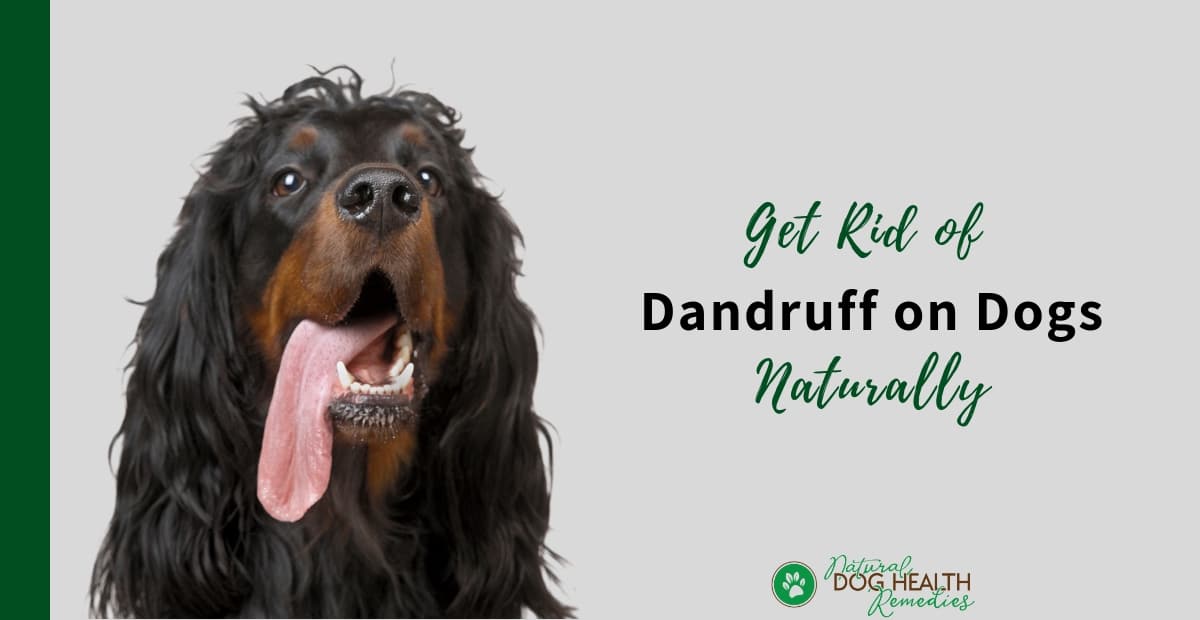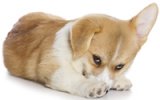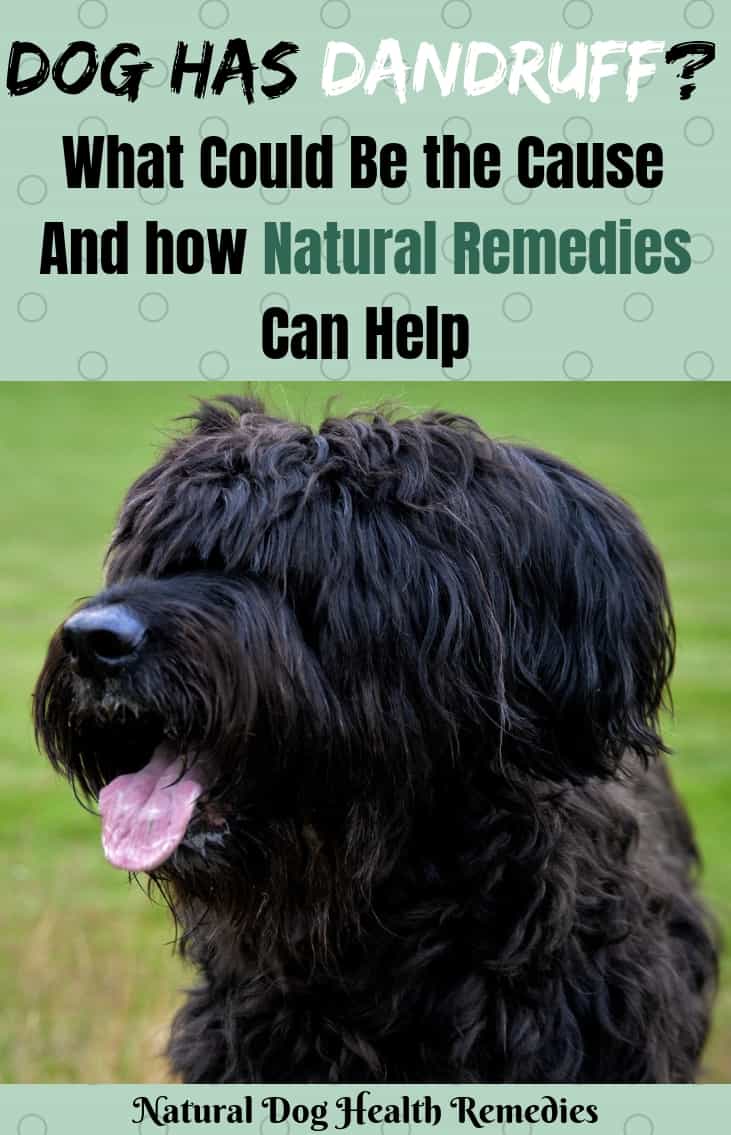Dog Dandruff Causes and Home Remedies
(FTC Disclosure: If you make a purchase via a link on this page, I may receive a small commission, at no added cost to you.)

Overview
Finding some tiny white flakes on your dog's coat?
Just like people, dogs can have dandruff too. Dandruff is merely an accumulation of dried, dead skin cells and it is actually a rather common condition in dogs.
Our dog's skin is constantly replacing old cells with new ones.
However, when this skin-replacement cycle is out of sync, dandruff will appear on the dog's coat, mostly around the neck, the back and the rump.
This article looks at some possible causes of dogs having dandruff, and how to use natural home remedies to alleviate this problem.
What Causes Dogs to Have Dandruff?
There are many possible causes for dogs to have dandruff. The most common ones (and the easiest ones to fix) are:
- Poor Diet: A diet that is not well-balanced in nutrients, especially one that is deficient in Omega-3 fatty acids, is the leading cause of dandruff.
- Low Humidity: Low humundity in the air causing dry skin can result in dandruff in dogs. If you live in a place with extremely dry air, consider using a humidifier in the room where your dog sleeps.
- Inadequate Grooming: Not brushing or bathing a dog regularly can also lead to dandruff. In particular, double-coated dogs or dogs with long and thick haircoat can easily have dead skin cells trapped in the hair if they are not groomed adequately.
- Inadequate Exercise: Regular exercise boosts the immune system of a dog. Dogs with a healthy and strong immune system usually have healthy skin.
In addition to the above, sometimes dog dandruff can be caused by some underlying physical health problems. For example, hormonal imbalance (such as hyperthyroidism and hypothyroidism) can lead to dry skin.
Diseases that cause the dog to lose a lot of bodily fluid through excessive urination or defecation will also result in dryness of the skin, causing dandruff to appear. Such diseases include:
Certain sort of skin irritation in dogs can also lead to dandruff. Skin irritation usually will speed up the skin reproduction rate, causing dandruff to form.
One common skin irritant is a mite that lives on the outermost layer of the skin. This mite is minute and appears as a white speck if put on black paper. It is called "cheyletiella mite" and since it moves around and looks like dandruff, it is commonly called "walking dandruff".
Other skin parasites can also cause dandruff in dogs. For example, fleas can cause dandruff over the hips, and scabies causes dandruff on the dog's ears and the elbows.
Try These Remedies to Get Rid of Your Dog's Dandruff
If you can rule out that your dog's dandruff is caused by some underlying health problems, then try the following to improve your dog's skin condition.
Omega-3 Fatty Acids
As a dietary supplement (and this is particularly important if you are feeding your dog a commercial diet), fish body oil should be added to your dog's food to provide omega-3 fatty acids which are essential for rich healthy coat in dogs.
Commercial dog food such as kibbles are typically cooked on high heat. However, omega-3 fatty acids are very sensitive to heat (and light). Therefore, during the cooking and processing of commercial dog food, the omega-3 FAs in the food are rendered inactive and they are no longer beneficial to your dog.
Vitamin E
Vitamin E is an antioxidant and can help give your dog a healthy and shiny coat without dandruff. Give Vitamin E together with Omega-3 fatty acids to prevent vitamin E deficiency. (Dosage: 5-10 mg per pound of body weight, daily)
Herbs
Herbs that are good for dog's skin include oat, aloe vera, green tea, echinacea (or goldenseal).
Apple Cider Vinegar Rinse
Apple cider vinegar works wonder in soothing itchy dry skin and getting rid of dandruff on dogs. If your dog has dandruff, try massaging full-strength ACV into his hair coat before shampooing.
Coconut Oil Whole Body Treatment
Topically, you can do a whole body coconut oil treatment on your dog once a week. Coconut oil can keep your dog's skin nourished and healthy.
To do a whole body coconut oil treatment, follow these steps:
- Bath your dog with a mild dog shampoo first. Pat dry.
- Apply coconut oil generously to his whole body - from the tip of his ears, to his legs, between the toes, under the "armpits", the tummy, the back, and the tail.
- Leave the oil on for about 5 minutes.
- Shampoo your dog again to wash the oil off your dog's skin and fur.

Natural Products To Make Your Dog's Coat Shine
This wild Alaskan salmon oil provides the perfect balance of the Omega 3 and 6 and contains all the EFAs needed for healthy and shiny haircoat.
Another great natural product is a soft chew which your dog would love to have:
This natural product has a lot of herbs that support skin health (e.g. burdock, red clover, yellow dock, calendula) and the soft chew is a perfect way to supplement your dog!
This shampoo contains soothing herbs (such as oatmeal, aloe vera, green tea, goldenseal) and can be used for itching, dandruff, and certain types of dermatitis such as hot spots. You can also use it to regularly bath your dog to help control body odors.
Prevention of Dog Dandruff
 We can do several simple things that can prevent our dogs from getting dandruff:
We can do several simple things that can prevent our dogs from getting dandruff:
Natural Diet
Feed your dog a natural, preferably home-prepared diet. Use tonic herbs on a regular basis to detox and strengthen the immune system. (Please refer to my article on Dog Skin Irritations on this topic.)
Regular Grooming
As mentioned above, regular brushing can remove dead skin cells from the dog. In addition, grooming helps distribute the oils on the dog's skin and coat.
Get into the habit of brushing your dog every day. It is also a good opportunity for you spend some quality time with your dog. While brushing your dog, you can also check to see if there are any abnormalities in your dog's skin and body.
Regular Exercise
Regular exercise is also essential to maintain the dog's health and immune system. Exercise such as walking, free-running and visits to new areas can stimulate good health. When a dog is healthy, her coat will be shiny and problem-free.
ReferencesC.J. Puotinen, Natural Remedies for Dogs and Cats (Keats Publishing, 1999).
R.H. Pitcairn, The Complete Guide to Natural Health for Dogs and Cats (Rodale, 2005).
W.J. Dodds, D.R. Laverdue, Canine Nutrigenomics - The New Science of Feeding Your Dog for Optimum Health (Dogwise Publishing, 2015).





